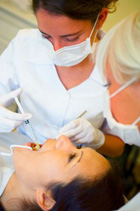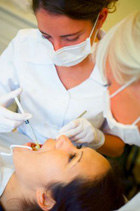 Complications come and go in the mouth, yet by popping along to see your dentist in Leeds, most can be sorted out quite easily, but this is not the case with a tooth abscess. When an abscess erupts, it starts to mess with the whole of your body; your face will swell uncontrollably and your mouth will be in severe pain once the problem blows up. During all this, the abscess will leak poison into the bloodstream and this is where the condition becomes dangerous, because these toxins will bleed into the brain and in some cases, it can put you into a coma and a life threatening situation. It all starts with poor oral hygiene which leads to tooth decay; once the inside of your tooth has been infected, it has nowhere to go and will then infect the surrounding gum tissue, causing a build up of poison and hence, lead to the abscess. Take no chances with this and if you can’t get hold of your dentist, get to the hospital, because you need to be pumped full of antibiotics to prevent things from going further. Only then can your dentist get to work on the tooth by doing a root canal to clear the infection from within the tooth. However, by getting your first abscess, it means that you have opened a portal to hell: abscesses don’t back down and they have a habit of coming back and if they do, the only way you can stop yourself treading dangerously again is to have the tooth removed.
Complications come and go in the mouth, yet by popping along to see your dentist in Leeds, most can be sorted out quite easily, but this is not the case with a tooth abscess. When an abscess erupts, it starts to mess with the whole of your body; your face will swell uncontrollably and your mouth will be in severe pain once the problem blows up. During all this, the abscess will leak poison into the bloodstream and this is where the condition becomes dangerous, because these toxins will bleed into the brain and in some cases, it can put you into a coma and a life threatening situation. It all starts with poor oral hygiene which leads to tooth decay; once the inside of your tooth has been infected, it has nowhere to go and will then infect the surrounding gum tissue, causing a build up of poison and hence, lead to the abscess. Take no chances with this and if you can’t get hold of your dentist, get to the hospital, because you need to be pumped full of antibiotics to prevent things from going further. Only then can your dentist get to work on the tooth by doing a root canal to clear the infection from within the tooth. However, by getting your first abscess, it means that you have opened a portal to hell: abscesses don’t back down and they have a habit of coming back and if they do, the only way you can stop yourself treading dangerously again is to have the tooth removed.







 All the different parts of your body are linked together in innumerable ways, through the blood stream, nervous system and beyond. No part of your body is an island, isolated from the rest of it and a problem in one part of your body can affect others. You should get any health problems treated so it cannot affect the rest of you. This is true of your mouth as much as anywhere else as oral hygiene problems can become concerns for other parts of you beyond just your mouth.
All the different parts of your body are linked together in innumerable ways, through the blood stream, nervous system and beyond. No part of your body is an island, isolated from the rest of it and a problem in one part of your body can affect others. You should get any health problems treated so it cannot affect the rest of you. This is true of your mouth as much as anywhere else as oral hygiene problems can become concerns for other parts of you beyond just your mouth. When a tooth becomes infected as the result of dental decay, the body responds by producing excess white blood cells to fight the infection. This combines with the infected matter to form a substance called pus, which can often build up in the tooth and in the softer gum tissue around the root. This leads to a swelling called a tooth abscess, which is very sensitive and often very painful.
When a tooth becomes infected as the result of dental decay, the body responds by producing excess white blood cells to fight the infection. This combines with the infected matter to form a substance called pus, which can often build up in the tooth and in the softer gum tissue around the root. This leads to a swelling called a tooth abscess, which is very sensitive and often very painful. The health of your teeth is very important. Just ask anyone who has suffered the pain of serious toothache or losing a tooth to infection. Cleaning with brushing and flossing is very important to remove plaque and keep your teeth safe from cavities and other dental traumas such as tooth abscesses. But it is important not to ignore the health of your gums, as these can be just as important to your overall oral health.
The health of your teeth is very important. Just ask anyone who has suffered the pain of serious toothache or losing a tooth to infection. Cleaning with brushing and flossing is very important to remove plaque and keep your teeth safe from cavities and other dental traumas such as tooth abscesses. But it is important not to ignore the health of your gums, as these can be just as important to your overall oral health. When tooth decay occurs and the protective layer of enamel is removed, the sensitive inner part of the tooth containing the dental nerve and root is exposed to the possibility of infection. If infection does take hold in the tooth, the body will naturally respond by producing an excess of white blood cells to fight it. These cells mix with the infected material to produce a substance called pus (also found in blisters and spots), which builds up in an abscess around the root of the tooth.
When tooth decay occurs and the protective layer of enamel is removed, the sensitive inner part of the tooth containing the dental nerve and root is exposed to the possibility of infection. If infection does take hold in the tooth, the body will naturally respond by producing an excess of white blood cells to fight it. These cells mix with the infected material to produce a substance called pus (also found in blisters and spots), which builds up in an abscess around the root of the tooth. When plaque and bacteria attack the protective layer of tooth enamel that surrounds the tooth, they begin to erode it. This causes cavities, that eventually leads to tooth decay exposing the sensitive inner parts of the teeth, including the dental nerve, to infection. If an infection occurs in the tooth, the body will respond by producing an excess of white blood cells to combat the infection.
When plaque and bacteria attack the protective layer of tooth enamel that surrounds the tooth, they begin to erode it. This causes cavities, that eventually leads to tooth decay exposing the sensitive inner parts of the teeth, including the dental nerve, to infection. If an infection occurs in the tooth, the body will respond by producing an excess of white blood cells to combat the infection. Without the necessary dental care our teeth may be at risk from a number of dental problems. This ranges from mild tooth decay and gum disease to the more serious tooth abscess and even tooth loss. The one thing common to all these forms of dental problem is the pain that accompanies them. Even a mild gum disease could be responsible for causing irritation and pain and the more serious the problem, the more likely it is to cause significant pain.
Without the necessary dental care our teeth may be at risk from a number of dental problems. This ranges from mild tooth decay and gum disease to the more serious tooth abscess and even tooth loss. The one thing common to all these forms of dental problem is the pain that accompanies them. Even a mild gum disease could be responsible for causing irritation and pain and the more serious the problem, the more likely it is to cause significant pain. There are few if any dental problems that cannot be treated successfully if diagnosed early enough. Ideally, any pain or discomfort experienced in the mouth should be seen by a dentist as soon as possible. With dental care it is prevention that is much more effective than cure. This is why dentists stress the importance of six-monthly check ups.
There are few if any dental problems that cannot be treated successfully if diagnosed early enough. Ideally, any pain or discomfort experienced in the mouth should be seen by a dentist as soon as possible. With dental care it is prevention that is much more effective than cure. This is why dentists stress the importance of six-monthly check ups.

